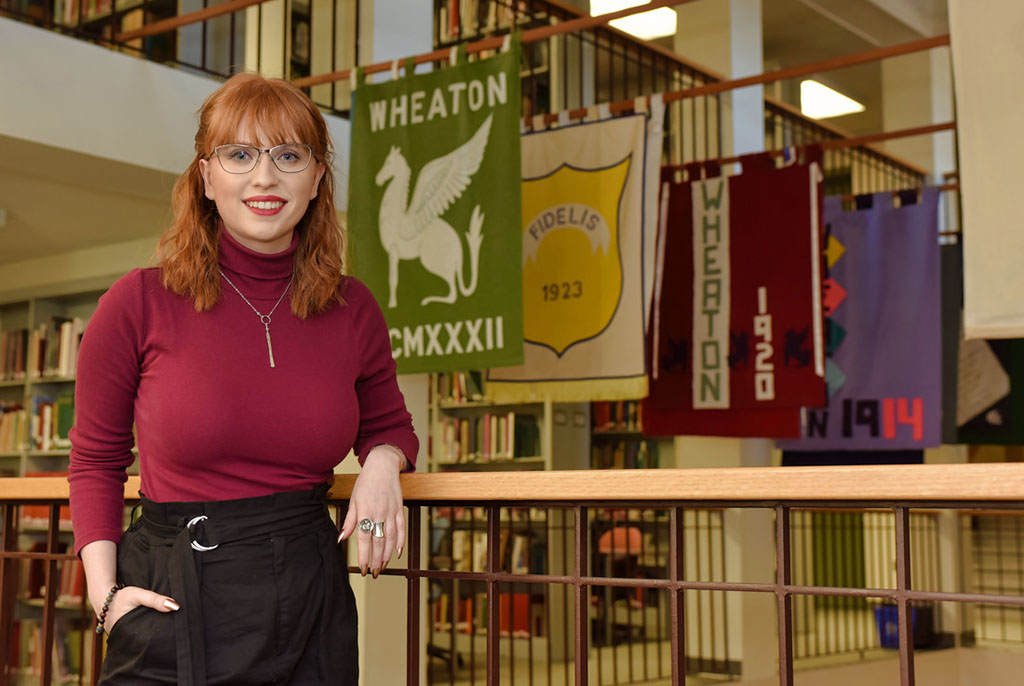Uncovering history

Senior gives campus talk on hometown women
Popular culture often celebrates the big events in history—campaigns, battles, disasters, discoveries—but what about all the moments and people in between? Senior history major Marisa Hexter ‘19 believes it’s worth exploring some of the less known parts of history, starting with her own hometown.
Speaking to a Wheaton audience on October 25, Hexter shared her original research on the lives of five extraordinary women from North Haven, Conn., in a presentation titled “The Unusual, Unlikely, Unexpected and Unacknowledged: Who Were These Women?” The talk was Hexter’s second on the subject; she originally gave the presentation last summer at a public event sponsored by the North Haven Historical Society and Museums.
The project began two summers ago, during an internship supported by a Wheaton Fellowship.
“I created a research guide [a guide to items in the collections] for women’s history for my local historical society, which I’ve been volunteering at since I was a sophomore in high school,” said Hexter, a double major in history and Italian studies. “This past summer, I came back from studying abroad [at the University of Edinburgh] and I didn’t have a job, so I went back for one final project for them. I decided to work on the question of why women are forgotten in history, and I focused on these five women in my town that I’ve come to know through volunteering there and that I feel did amazing things for our community.”
Her research took her to historical organizations and museums throughout the area, as well as to the archives at Yale University. Among the women she researched were Hannah Coady, an Irish immigrant who ran one of the largest brick companies in the eastern United States in the late 1800s—believed to be the only women to do so, and Hannah Heaton, an 18th-century farm wife who kept a detailed diary about her daily life and religious beliefs that provides evidence of what life was like during the French and Indian and Revolutionary wars.
Other women had a direct impact on their community, such as Eva Louise Bradley, an early 20th-century musician and composer who taught music to local children and put on community performances, and who notably taught a deaf woman how to play the piano by creating techniques to help the woman “hear” the music.
In addition to sharing these women’s stories, Hexter’s presentation touched on why public history organizations should integrate women’s stories more permanently into their collections.
“In history we think of everybody as either a sinner or a saint, especially women, and in this presentation you can see that, even if they’re just ordinary women, they do matter a lot to their community,” Hexter said. “History didn’t just happen to men, as we see in a lot of history books. It happened to women; it happened to children. Everybody together affects your community, and when you live in a certain town or city I think you should be able to know where you come from.”
Hexter, who is vice president of Wheaton’s History Club and has worked in the Gebbie Archives since her sophomore year, said she has always had a strong interest in history. She started volunteering at the North Haven Historical Society in high school and discovered there that she enjoyed working with the public.
“Public history is a non-academic setting. It has more of a connection to the community,” Hexter said. “I don’t want to be a teacher, but I want to be able to teach the community in a way that is beneficial. So, no matter if you’re eight or 80, you have the same learning experiences about the place where you live or the places you visit.”
Associate Professor of History Dana Polanichka, chair of the History Department, said she was immediately impressed by the project when Hexter proposed a talk.
“From the moment she approached me, it became clear that Marisa’s enthusiasm for the project was infectious, and we wanted our community—especially our students—to see that enthusiasm and to discover what was possible for undergraduate students,” Polanichka said.
The October 25 talk was co-sponsored by the History Club and the History Department and drew a large, engaged audience, Polanichka said.
“History so often ignores local histories as well as women’s histories in favor of studying powerful nations, expansive empires, and, of course, ‘great men.’ When we do so, we lose sight of the full picture in all its complexity and depth,” Polanichka said. “Studying local history not only enhances our understanding of the collective historical experience but also provides insight into the individual experience. That then helps us more deeply cultivate historical empathy.”
Hexter credits her Wheaton experience, both in and out of the classroom, with helping her develop a skill for public speaking, and said she feels confident about a career in public history.
“I never thought that I would be the person talking about history. I thought I would be the one writing about it. But over the summer, giving this presentation, I developed a newfound love for speaking to the public,” Hexter said. “Even if it’s in a large group, you’re able to really see how people are reacting to what you’re talking about. It makes me feel like what I’m doing is worth it.”
